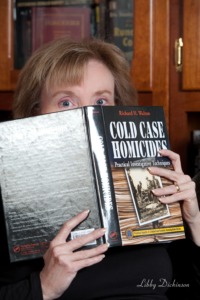Telling Details
by Cathy Pickens
 A woman went missing near Charlotte. The usual speculation swirled: Had someone harmed her? Kidnapped her? Had she abandoned her family to start a new life elsewhere? Did she have an accident and lose her memory—or die somewhere undiscovered?
A woman went missing near Charlotte. The usual speculation swirled: Had someone harmed her? Kidnapped her? Had she abandoned her family to start a new life elsewhere? Did she have an accident and lose her memory—or die somewhere undiscovered?
Any one of those questions leads to a wealth of story possibilities for a writer. The questions and wondering. The grief. The loss and heartache. The mystery.
Twenty-two years later, I clipped the newspaper article and photograph published when her car was found. She’d simply run off the road. The car submerged in water had never been spotted. No crime. Plenty of suspicion. Plenty of writing fodder. As a reader, I wanted more of the story.
That might have been the start for me. I became fascinated with submerged cars, missing people, and lives disrupted. The news reports showed what the car looked like after two decades, the process of raising it out of the water, the condition of the evidence that remained—good details for a writer.
In another case, an economics professor at Charleston Southern University created a lot of buzz with his adroit stock investments. His purple Jaguar, crazy bright suits, and diamond-encrusted pens helped the local-boy-made-good attract 600 investors and over $100 million—including $10 million of the university’s endowment. A routine government audit of investment advisers raised questions. The house of cards fluttered away in the collapse. A small-town swindle doesn’t make international headlines. After all, Bernie Madoff was doing it bigger and better elsewhere. But this was small, historic Charleston, where the intimacy of the relationships magnified the betrayal. The crime wasn’t as interesting as the guy who could pull it off and what it did to those who’d been betrayed.
Writers routinely borrow “crime-adjacent” characters and incidents to enrich their fiction:
- Inspector Bucket (based on Charles Dickens’ acquaintance with Inspector Charles Field, one of the London Met’s first detectives) earned a memorable role in Bleak House.
- An inconvenient girlfriend and an ambitious young man in Theodore Dreiser’s An American Tragedy (and the movie A Place in the Sun, starring Elizabeth Taylor and Montgomery Clift) were based on a real domestic betrayal in the Adirondack Mountains.
- Gaston Means, a schoolteacher and towel salesman for Cannon Mills, became a player in Warren Harding’s corrupt administration. He also convinced the owner of the Hope Diamond that giving him her money could save the Lindberg baby, and he eventually became a character in Martin Scorsese’s Boardwalk Empire.
Real stories of crime and mayhem fascinate me. They offer complex characters, puzzles to unravel, fascinating details, familiar motivations carried to extremes, and settings that allow a peek behind a curtain into an unaccustomed world. But real-life accounts can be unsatisfying. The loose ends aren’t tied up, the motivations aren’t clear. As a reader, I need fiction to make sense of a story. As a writer, I look to real crime cases for telling character details that bring fiction to life—straight from the historic headlines.
Learn How to Read the News for Fiction with Cathy
TUESDAY, NOVEMBER 12: “Using True Crime to Write Engaging Fiction,” 6:00–8:00 p.m., Charlotte Lit, 933 Louise Avenue (@hygge–Belmont). Info and registration
This class will explore how writers, from Charles Dickens to Patricia Cornwell, have used real crime to create memorable fiction. We’ll discuss why we read (and write) fiction, based in neurobiological and psychological research; and examine a variety of crime research sources for developing plot ideas, characters, motives, forensics, and investigation techniques for your writing projects.
Members save $15 on this class. Log in as a member or join to receive discount.
About Cathy
Cathy Pickens writes crime fact and crime fiction. Her first novel, Southern Fried, won St. Martin’s Best New Traditional Mystery award (re-released as Blue Ridge Mountain Mysteries by Joffe Books). She also writes regional true crime for History Press and is crime columnist for Mystery Readers Journal. Professor emerita in the McColl School at Queens University, she won numerous teaching awards and provides leadership development for corporate executives and writing and creativity workshops. She served as national president of Sisters in Crime and on boards of Mystery Writers of America and Mecklenburg Forensic Medicine Program (regional evidence collection/preservation training collaborative). Author website
Cathy will also be teaching “Start Here” at Charlotte Lit on January 16, 2025.
